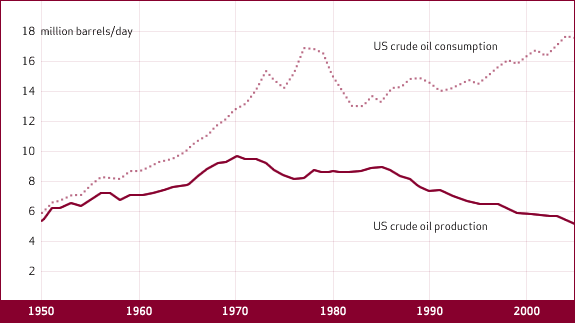Markets
The United States, once a major producer and exporter of oil, has seen oil production decline at the same time that gasoline and other oil consumption has continued to grow, making the country steadily more dependent on imported oil and leading to concerns over energy security. Coupled with the rapid rise in gasoline prices during 2005 and 2006, this has led to greater consumer interest in more fuel-efficient vehicles.
Concerns about fuel economy track fuel prices and drive buyers to shift from larger vehicles and light trucks to smaller vehicles, cars and crossovers. During 2006, small cars and crossover utility vehicles, which generally have better fuel economy than large cars and truck-based SUVs, were the fastest (and some of the only) growing segments of the U.S. market.
In Europe, where awareness of climate change and vehicle CO2 emissions is relatively high and growing, already high fuel prices have also risen sharply in recent years. This has continued to reinforce interest in diesel-powered vehicles, which now account for around half of new vehicle sales in the EU, and other environmentally advanced vehicle technologies. The climate change issue is also linked to concerns about and actions to address congestion, particularly in city centers.
In the markets in which we operate in Asia, the rapid growth in vehicle sales is raising concern about emissions and congestion. A focus on energy independence is also growing along with the rapid rise in demand for energy.
In Brazil, consumers have embraced renewable ethanol as an economical, locally produced alternative to imported oil. This has come about via 30 years of coordinated effort between the government, consumers, fuel providers and automakers.
These market shifts and regional concerns are very significant to our Company. In North America, although our sales market share for cars increased in 2006, the shift away from SUVs and light trucks, our most profitable vehicles, contributed to our loss of revenue and overall market share. Elsewhere in the world, where our profitability is less dependent on large vehicles, we have been less affected. Everywhere we operate, the future financial health of our Company depends on our ability to predict market shifts of all kinds, including those resulting from consumer concerns over fuel prices, greenhouse gas (GHG) emissions and energy security, and our ability to be ready with the products and services our customers demand.
